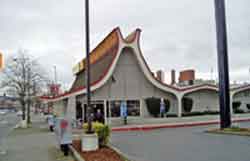When the Seattle Monorail Project (SMP) property sales deadline arrives next week, the agency will finally learn if it has recouped enough millions needed to help pay off debt and close the doors. The government agency hopes to be at least as successful as some of the private sellers it bought the land from in the first place.
Newly released records show that the agency paid $58 million for parcels that are now collectively assessed at just $37 million. That includes a vacant lot in West Seattle that sold for $400,000 in 2002 and which the agency purchased for $2.1 million last year. It is one of 33 parcels on sale that were bought through negotiations kept from the public eye, hashed over in executive session by the agency’s board of directors. The project was scuttled late last year.
Sales documents indicate the 14,000-square-foot Avalon Way Southwest parcel was bought at a rock-bottom price by a developer in 2002. He then sunk additional money into the property in anticipation of building a 60-unit apartment/retail complex, until SMP decided it needed the lot as right-of-way for the planned 13.7-mile monorail line from Crown Hill to West Seattle. An SMP appraisal in late 2004 put the property’s value at $1.7 million—$1 million for the land, $450,000 for a master use permit the owner had obtained, and $220,000 for development work in progress. The developer offered up a dueling appraisal that came in at $2.4 million. SMP ultimately agreed to a $2.1 million deal.
Similarly, SMP paid $16.5 million for the now-vacated campus of Northwest Center charities in Interbay, assessed at $11.5 million, and forked over $1.8 million for a SoDo property assessed at $368,000. Property assessments done by the county for taxing purposes usually don’t reflect full value. But they can be indicative: An Interbay residential plot SMP bought for $310,000, for example, is assessed at $300,000.
As the vacant-lot deal demonstrates, however, the true worth of a property is whatever you can get for it. SMP, in buying the land, also had to factor in an assortment of relocation and future-development costs and, in some cases, court rulings. And while the right-of-way and station-site purchases inherently drove up prices, the agency hopes to cash in on that now. It expects to make $60 million or more from the sales to help retire nearly $100 million in debt.
The property churning has also made some land too valuable to remain in use as is. Thus, even though the monorail no longer needs the properties, some popular neighborhood spots such as the Denny’s restaurant in Ballard likely still will be closed. The highest and best use of that site, according to SMP appraisals, is as a retail/residential development. (The Denny’s lease expires in 2008.) Records show SMP paid $7.5 million for the Denny’s property, assessed at $3.4 million. But SMP could cash in on that site. The previous owners say they had been offered $11 million for the property before SMP took it through legal action.
Some planned property takeovers—such as the “sinking ship” parking garage site in Pioneer Square—were halted after voters aborted the three-year-old monorail plan in November. But by law none of the completed deals could be reversed or the land given back; SMP is also obligated to sell the property at the highest obtainable price on the open market, as it is doing now, with a sealed-bid deadline of March 17. The agency’s plan is to finalize sales by the end of May. Along with revenue from a continuing 1.4 percent Seattle vehicle-license tax, SMP expects to retire all debts and be out of business by the end of this year.
The 33 parcels include homes, apartment buildings, and parking lots. Full details along with appraisals, surveys, and environmental assessments are viewable at www.monorailproperty.com.








